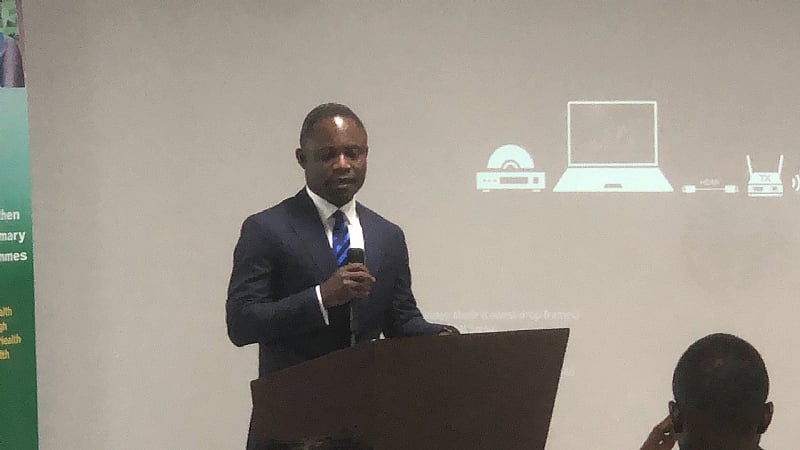Minister of Health, Hon. Mintah Akandoh, has reaffirmed government’s commitment to ensuring equitable access to healthcare for all Ghanaians, especially at the community level.
He made this known during the National Forum to Strengthen Community Health and Primary Health Care Programme, held under the theme: “Achieving Universal Coverage Through Strengthened Community Health Systems for Better Health Outcomes.”
Addressing a diverse group of stakeholders, health professionals, and development partners, he said the forum reflects a collective commitment and effort toward building a resilient and inclusive health system that leaves no one behind.
According to him, the forum is expected to foster collaboration and explore innovative approaches to strengthen community health systems as a cornerstone of universal health coverage, through meaningful dialogue and strategic partnerships aimed at advancing policies and practices that ensure accessible, equitable, and high-quality healthcare.
“It is striking to note that the government firmly recognizes that healthcare is not a privilege but a fundamental right. The one that must be accessible to all regardless of location or socioeconomic status.
“That is why the National Democratic Congress (NDC) in its 2024 manifesto outlined a comprehensive plan to strengthen community health systems, ensuring that every Ghanaian has access to quality healthcare at their doorstep,” he emphasised.
He, however, acknowledged that challenges — including limited financial access, gaps in service readiness, and inadequate infrastructure — continue to hinder healthcare accessibility.
To address these barriers, he said there is a need to implement the right policy reforms, invest strategically, and foster stakeholder collaboration.
“Sustainable financing as outlined in the health financing strategy is essential to building long term resilience ensuring that Ghana’s community health system remains robust in achieving universal health coverage,” he stated.
As part of efforts to address these challenges, he noted that the government is committed to expanding Community Health Planning and Services (CHPS) coverage, ensuring that health facilities are adequately equipped to serve communities efficiently, and revitalizing the national health scheme to reduce out-of-pocket expenses and improve financial accessibility for all.
He added that other priority areas include enhancing service readiness by strengthening infrastructure, investing in the health workforce by increasing the number of trained community health workers, equipping them with the necessary resources, and ensuring fair compensation for their invaluable services.
Prof. Fred Binka, Professor of Clinical Epidemiology at the University of Health and Allied Sciences (UHAS), highlighted the essential role of CHPS compounds in achieving universal healthcare.
According to him, CHPS compounds account for 61 percent of health facilities in Ghana: “If you close all the CHPS compounds tomorrow, there’s only 39% that will have health care.”
He emphasized the need for affordable and accessible healthcare: “Everybody must have access to health at a cost that they can afford. And we have determined that the way to go there is through community health care systems.”
He stressed the importance of health support for all. “And the primary health care is the main engine towards that.”
Prof. Binka also encouraged regular health check-ups, including temperature, blood pressure, weight, and urine tests for sugar levels, to help prevent chronic diseases.
“If you get the chronic disease, it’s too late. Tomorrow when you are diagnosed as hypertension, for the rest of your life, you are going to be treating yourself,” he added.
Dr. James Guwani, Head of Division for Community Health Systems and Health Promotion at the Africa Centre for Disease Control (CDC), highlighted the lessons from the COVID-19 pandemic and recent disease outbreaks across Africa as a reminder of the urgent need to build a resilient health system rooted in strong community health structures.
“As we work toward strengthening our community health initiatives, let us remain focused on building back better a goal that aligns with our vision to ensure that every person in Africa has access to equitable, effective, and quality healthcare.
“Community health is not merely a sector; it is the heartbeat of our health systems,” he emphasised.
He commended Ghana for its leadership in promoting community health initiatives, especially through the flagship CHPS programme and its commitment to making primary health care services completely free.
He added that the Africa CDC remains committed to playing its continental leadership role in disease control and prevention, in collaboration with all member states as mandated by the African Union statute.


